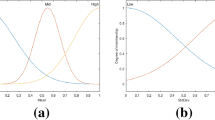Abstract
The image quality evaluation is an important subject in image processing techniques. Aiming to improve the existing methods of image quality measurement, a new fuzzy logic-based image quality evaluation approach is presented in this paper. It is well known that an image is composed of details (edge, texture) and smooth regions, according to several fuzzy inference rules, three different quality factors are defined and applied to their respective regions. The proposed approach separates the distorted effects from the original edges in the image, and avoids the edges being mistaken as distorted effects. Experimental results show that the proposed method is robust for various image, in addition, it has the general performance of image quality evaluation approaches.
Access this chapter
Tax calculation will be finalised at checkout
Purchases are for personal use only
Similar content being viewed by others
References
Park HJ, Har DH (2011) Subjective image quality assessment based on objective image quality measurement factors. IEEE Trans Consum Electron 57(3):1176–1184
Li Q, Wang Z (2009) Reduced-reference image quality assessment using divisive normalization-based image representation. IEEE J Sel Top Sig Process 3(2):202–211
Sheikh HR, Sabir MF, Bovik AC (2006) A statistical evaluation of recent full reference image quality assessment algorithms. IEEE Trans Image Process 15(11):3440–3451
Narwaria M, Lin W (2010) Objective image quality assessment based on support vector regression. IEEE Trans Neural Networks 21(3):515–519
Suthaharan S (2003) Perceptual quality metric for digital video coding. Electron Lett 39(5):431–433
Kolaman A, Yadid-Pecht O (2012) Quaternion structural similarity: a new quality index for color images. IEEE Trans Image Process 21(4):1526–1536
Karunaseker SA, Kingsbury NG (1995) A distortion measure for blocking artifacts in image based on human visual sensitivity. IEEE Trans Image Process 4(6):713–724
Minami S, Zakhor A (1995) An optimization approach for removing blocking effects in transform coding. IEEE Trans Circuits Syst Video Technology 5(2):74–82
Author information
Authors and Affiliations
Corresponding author
Editor information
Editors and Affiliations
Rights and permissions
Copyright information
© 2013 Springer-Verlag London
About this paper
Cite this paper
Ji, Q., Chen, B. (2013). Efficient Approach of Image Quality Evaluation Based on Fuzzy Logic. In: Du, W. (eds) Informatics and Management Science V. Lecture Notes in Electrical Engineering, vol 208. Springer, London. https://doi.org/10.1007/978-1-4471-4796-1_87
Download citation
DOI: https://doi.org/10.1007/978-1-4471-4796-1_87
Published:
Publisher Name: Springer, London
Print ISBN: 978-1-4471-4795-4
Online ISBN: 978-1-4471-4796-1
eBook Packages: EngineeringEngineering (R0)




